The Gentleman’s Magazine & Poetry… Still learning…
September 28, 2020 by Stephanie Williams · Leave a Comment
Nestled among the prosaic commodity prices, legal decisions, and historical chronicles that regularly appear in an issue of Gentleman’s Magazine is a section that seems surprising to me — “Select Poetry, ancient and modern.” In some ways, this is a reminder that times certainly have changed, and things are not as they always were. A current publication for the leaders of our era, such as Forbes or Bloomberg or The Wall Street Journal would not contain poetry, unless a noteworthy personage deviated from business acquisition long enough to write, or possibly promote a struggling artist in the name of philanthropy, etc.
But, once upon a time, the well-educated person was learned in literary as well as economic matters. As the 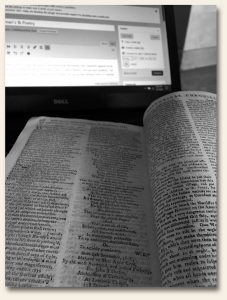 column title hints, the classical emphasis on education set a background that persisted into all arenas of life. With this in mind, I delved into the section and became even further struck by the subject matter of my sampling in meter and rhyme. The closing refrain to each stanza concludes that nothing in life matters without….love.
column title hints, the classical emphasis on education set a background that persisted into all arenas of life. With this in mind, I delved into the section and became even further struck by the subject matter of my sampling in meter and rhyme. The closing refrain to each stanza concludes that nothing in life matters without….love.
But weak is our vaunt
While something we want,
More sweet than the pleasure that Prospects can give.
Come, smile, damsels of Cardigan,
Love can alone make it blissful to live.
The author of this particular poem only provided his (presumably) initials to this listing of Prospects, Nectar, Odours, Music, Friendship, Learning, Riches and Honour. All, the poet asserts, are not sufficient to bring bliss to life — only love can do that. The musings that follow include “Ode to a Goldfinch”, “An Astronomical Thought” and “A Translation of the Epitaph”. Put together, they summarize the principle concerns of the time period — the natural and known world, the world yet to be discovered, happiness within all experiences, and the context provided by knowledge of eventual death.
That is, indeed, a selection of ancient and modern — even the modern of today.
I’m New Here: Week Seventeen…
June 7, 2019 by Stephanie Williams · Leave a Comment
Despite the obvious gender bias inherent in the title, I like “The Gentleman’s Magazine“, as I suspect many non-gentlemen of the time did as well. This week I pulled an issue from April of 1775 – mainly because I enjoy the tone of superiority that saturates those months before what we now know of as the Revolutionary War (or whichever various title you prefer). “Colonial upstarts” were causing commotion and consternation to the rest of the world, but mainly to the ruling class in London.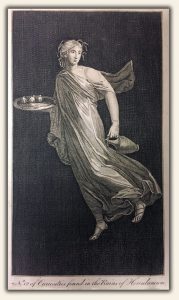 The heading of the very front page of the one perched on my desk amidst the new catalog excitement is entitled, “Continuation in the House of Lords on the Address to his Majesty respecting the Situation of Affairs in America”. What follows is a labyrinthine balance between appeasing the vanity of the monarch, and an attempt to elucidate the different aspects of potential vulnerability to defeat. In particular, the French and Spanish ships continuing to trade with the colonists brought great consternation. “Does the noble Earl pretend to interpret this explanation [England would be “…at liberty to seize any of their ships trading with American subjects”] generally, so as to authorize our taking their vessels at sea? If he does not, what can such a vague deluding promise avail? If he does, then I will venture to assure his Lordship, that he is miserably deceived; and that the first attempt to prevent French or Spanish ships from navigating the American seas will furnish them with an opportunity of asserting their maritime freedom, of making reprisals, and of justifying their conduct to the other great states of Europe, who are known to be long jealous of what they are pleased to call our despotic claim to the sovereignty of the ocean.”
The heading of the very front page of the one perched on my desk amidst the new catalog excitement is entitled, “Continuation in the House of Lords on the Address to his Majesty respecting the Situation of Affairs in America”. What follows is a labyrinthine balance between appeasing the vanity of the monarch, and an attempt to elucidate the different aspects of potential vulnerability to defeat. In particular, the French and Spanish ships continuing to trade with the colonists brought great consternation. “Does the noble Earl pretend to interpret this explanation [England would be “…at liberty to seize any of their ships trading with American subjects”] generally, so as to authorize our taking their vessels at sea? If he does not, what can such a vague deluding promise avail? If he does, then I will venture to assure his Lordship, that he is miserably deceived; and that the first attempt to prevent French or Spanish ships from navigating the American seas will furnish them with an opportunity of asserting their maritime freedom, of making reprisals, and of justifying their conduct to the other great states of Europe, who are known to be long jealous of what they are pleased to call our despotic claim to the sovereignty of the ocean.”
When I read this, I start to understand a little bit this American spirit, this classification under which our country has been perceived by the world, from the very earliest days. This mindset changed the world. And that is an immense, and not embarrassing, thought.
But, lest you think the GM’s are all politics, I would like to recommend any meteorology enthusiasts plug in the data compiled monthly and displayed on the inside cover page. The average prices of corn, wheat, rye, barley, oats and beans are delineated by county. Genealogists will enjoy the Births, Marriages, and Deaths alongside the list of Promotions and Bankrupts. There are book reviews and parish reports and a comprehensive section entitled “Historical Chronicle“, which gives an overview of multiple aspects of the state of the world.
Anyway, to delve into these accounts of the earliest days of this country is to see the tenacity that fueled an eventual nation – and perhaps nurture an admiration for what was once made, an inspiration for all that could be made again.
You can read more about Gentleman’s Magazines via previous posts at: Gentleman’s Magazines
The Traveler… digging into his job…
April 5, 2018 by The Traveler · 1 Comment
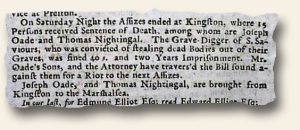 Earlier this week I journeyed to London, England, by the way of The Post Boy dated April 1, 1718. I found the reporting of a recent court, called Assize, where the grave-digger got a bit too involved in his work. “On Saturday Night the Assizes ended at Kingston, where 15 Persons received Sentence of Death, among whom are Joseph Oade and Thomas Nightingal. The Grave-Digger of S. Saviours, who was convicted of stealing dead Bodies out of their Graves, was fined 40 s. and two Years Imprisonment…”
Earlier this week I journeyed to London, England, by the way of The Post Boy dated April 1, 1718. I found the reporting of a recent court, called Assize, where the grave-digger got a bit too involved in his work. “On Saturday Night the Assizes ended at Kingston, where 15 Persons received Sentence of Death, among whom are Joseph Oade and Thomas Nightingal. The Grave-Digger of S. Saviours, who was convicted of stealing dead Bodies out of their Graves, was fined 40 s. and two Years Imprisonment…”
It made me ponder. What he did do with the bodies? And what did the others do to deserve the sentence of death and he to be only fined and imprisoned?
~The Traveler
The Traveler… it’s a boy… poetry in cards…
November 6, 2017 by The Traveler · Leave a Comment
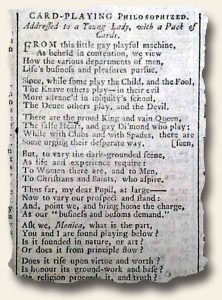 Today’s journey took me to London, England, by the means of The London Chronicle dated November 5, 1767 where great news was announced. “This day about noon the Queen was happily delivered of a Prince…This great event was soon after made known by the firing of the Tower guns. Her majesty is, God be praised, as well as can be expected; and the young Prince is in perfect health.” This was Prince Edward Augustus who would become the Duke of Kent.
Today’s journey took me to London, England, by the means of The London Chronicle dated November 5, 1767 where great news was announced. “This day about noon the Queen was happily delivered of a Prince…This great event was soon after made known by the firing of the Tower guns. Her majesty is, God be praised, as well as can be expected; and the young Prince is in perfect health.” This was Prince Edward Augustus who would become the Duke of Kent.
Also in this issue is an interesting nearly column-length poem entitled “Card-Playing Philosophized – Addressed to a Young Lady, with a Pack of Cards”.
~The Traveler
The Traveler… inhumanity at its worst…
August 21, 2017 by The Traveler · Leave a Comment
Today’s travels took me to Gloucester, England by the way of The Glocester Journal dated August 17, 1767. I found a very horrific report on the barbaric treatments that Elizabeth  Brownrigg did to the girl apprentices. She had beaten the one girl so viciously that, even though she had been found, the doctors were not able to save her life. “On Sunday morning one of the unfortunate girls who were cruelly beaten, and otherwise most barbarously treated by the their mistress… of the wounds she received from there said inhuman mistress… when it appeared by the evidence of the of the surviving girl, that, about a year and a half ago, the deceased was put apprentice, and was upon trial about a month, during which she eat and drank as the family did; that soon after her mistress, Elizabeth Brownrigg, began to beat and ill-treat the deceased, sometimes with a walking-cane, at other times with a horsewhip or a postillion’s whip… and beat her with a whalebone riding-whip on several parts of her body, and with the butt-end, divers times about the head, the blood gushing from her head and other parts of her body;…” A neighbor hearing noises from the lower area of the house had her journeyman investigate it and that is how she was found.
Brownrigg did to the girl apprentices. She had beaten the one girl so viciously that, even though she had been found, the doctors were not able to save her life. “On Sunday morning one of the unfortunate girls who were cruelly beaten, and otherwise most barbarously treated by the their mistress… of the wounds she received from there said inhuman mistress… when it appeared by the evidence of the of the surviving girl, that, about a year and a half ago, the deceased was put apprentice, and was upon trial about a month, during which she eat and drank as the family did; that soon after her mistress, Elizabeth Brownrigg, began to beat and ill-treat the deceased, sometimes with a walking-cane, at other times with a horsewhip or a postillion’s whip… and beat her with a whalebone riding-whip on several parts of her body, and with the butt-end, divers times about the head, the blood gushing from her head and other parts of her body;…” A neighbor hearing noises from the lower area of the house had her journeyman investigate it and that is how she was found.
~The Traveler
The Traveler… must have been a slow news day…
August 7, 2017 by The Traveler · Leave a Comment
I journeyed today to London, England via The Post Boy dated August 8, 1717. I found in the news from Paris that “On Wednesday last, about 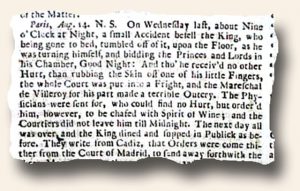 Nine o’Clock at Night, a small Accident befell the King, who being gone to be, tumbled off of it, upon the Floor… And tho’ he receiv’d no other Hurt, than rubbing the Skin off one of his little Fingers, the whole Court was put into a Fright… The Physicians were sent for, who could find no Hurt, but order’d him however, to be chased with Spirit of Wine…”
Nine o’Clock at Night, a small Accident befell the King, who being gone to be, tumbled off of it, upon the Floor… And tho’ he receiv’d no other Hurt, than rubbing the Skin off one of his little Fingers, the whole Court was put into a Fright… The Physicians were sent for, who could find no Hurt, but order’d him however, to be chased with Spirit of Wine…”
It must have been a slow news day if falling out a bed and receiving a skinned finger makes the big news! Hmmm, maybe the King had some of the “Spirit of Wine” prior to his going to bed as well? Food for thought!
~The Traveler
The Traveler… digging up skeletons…
March 20, 2017 by The Traveler · Leave a Comment
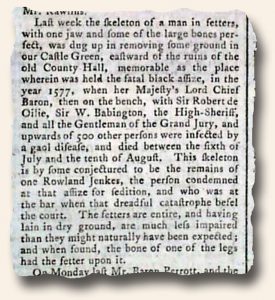 I journeyed today to Gloucester, England, through The Glocester Journal dated March 23, 1767. I found an interesting article “Last week the skeleton of a man in setters, with one jaw and some of the large bones perfect, was dug up in removing some ground in our Castle Green, eastward of the ruins of the old County Hall, memorable as the place wherein was held the fatal black assize, in the year 1577… upwards of 500 other persons were infected by a gaol disease, and died between the sixth of July and the tenth of August. This skeleton is by some conjectured to be the remains of one Rowland Jenkes, the person condemned at the assize for for sedition, and who was at the bar when the dreadful catastrophe befel the court…”. This was pertaining to the “Black Assize”.
I journeyed today to Gloucester, England, through The Glocester Journal dated March 23, 1767. I found an interesting article “Last week the skeleton of a man in setters, with one jaw and some of the large bones perfect, was dug up in removing some ground in our Castle Green, eastward of the ruins of the old County Hall, memorable as the place wherein was held the fatal black assize, in the year 1577… upwards of 500 other persons were infected by a gaol disease, and died between the sixth of July and the tenth of August. This skeleton is by some conjectured to be the remains of one Rowland Jenkes, the person condemned at the assize for for sedition, and who was at the bar when the dreadful catastrophe befel the court…”. This was pertaining to the “Black Assize”.
As per wikipedia: The Black Assize is a name given to multiple deaths in the city of Oxford in England between July 6 and August 12, 1577. At least 300 people, including the chief baron and sheriff, are thought to have died as a result of this event. It received its name because it was believed to have been associated with a trial at the Assize Court at Oxford Castle. A 19th-century account is more sure of the cause: ‘The assize held at Oxford in the year 1577, called the “Black Assize,” was a dreadful instance of the deadly effects of the jail fever. The judges, jury, witnesses, nay, in fact every person, except the prisoners, women and children, in court were killed by a foul air, which at first was thought to have arisen out of the bowels of the earth; but that great philosopher, Lord Bacon, proved it to have come from the prisoners taken out of a noisome jail and brought into court to take their trials; and they alone, inhaling foul air, were not injured by it.’
~The Traveler
Lava flowing on the moon?
March 14, 2016 by TimHughes · Leave a Comment
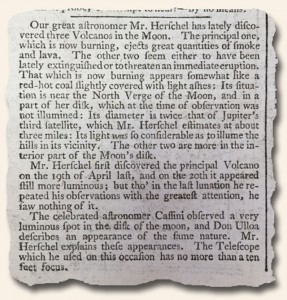 It can be easy to understand the limits of astronomy prior to our modern age when you read a report like the one found in “The Bath Chronicle” from England, June 14, 1787, which reports an observation by one of the more noted astronomers of the era. It begins: “Our great astronomer Mr. Herschel has lately discovered three volcanoes in the moon. The principal one, which is now burning, ejects great quantities of smoke and lava…” (see image).
It can be easy to understand the limits of astronomy prior to our modern age when you read a report like the one found in “The Bath Chronicle” from England, June 14, 1787, which reports an observation by one of the more noted astronomers of the era. It begins: “Our great astronomer Mr. Herschel has lately discovered three volcanoes in the moon. The principal one, which is now burning, ejects great quantities of smoke and lava…” (see image).
Sometimes reality defies reason…
November 30, 2015 by GuyHeilenman · Leave a Comment
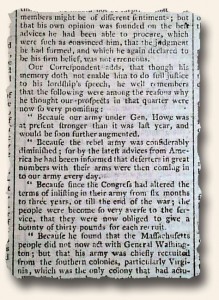 Just because the odds are stacked against us doesn’t mean we shouldn’t move forward. There are times when sticking to our guns is the right choice – regardless of our chances of success. This point was driven home in 1777 when Lord George Germaine presented his reasons why the American colonists had no chance of succeeding with their revolutionary effort before Parliament. If the American rebels had weighed the odds against them as itemized by Lord Germaine, they may have raised the white flag of defeat – and world history would have been forever altered. The full list of his reasons why the Americans would fail were printed in The London Chronicle of May 17, 1777. Thanks to our forefathers, they were driven by principle and not by the odds-makers of the day. Perhaps we should take a page from history and be driven likewise.
Just because the odds are stacked against us doesn’t mean we shouldn’t move forward. There are times when sticking to our guns is the right choice – regardless of our chances of success. This point was driven home in 1777 when Lord George Germaine presented his reasons why the American colonists had no chance of succeeding with their revolutionary effort before Parliament. If the American rebels had weighed the odds against them as itemized by Lord Germaine, they may have raised the white flag of defeat – and world history would have been forever altered. The full list of his reasons why the Americans would fail were printed in The London Chronicle of May 17, 1777. Thanks to our forefathers, they were driven by principle and not by the odds-makers of the day. Perhaps we should take a page from history and be driven likewise.
They put it in print… in two different editions…
November 9, 2015 by TimHughes · Leave a Comment
“Newsbooks” from Europe, those small pamphlet-looking periodicals which were the predecessors of today’s newspapers, have always been difficult to find. But rarely have we had a more intriguing issue than one recently added to our inventory, and its the back story which makes it interesting.
Rather than one, we have secured two issues of the “Mecurius Aulicus“newsbook, both of the same date, “The five and thirtieth Weeke” of 1643, one the “regular” Oxford edition, the other the secretly-printed and exceedingly rare London edition.
 This newsbook was created because of the English Civil War during the early 1640’s, as a means for the Royalist faction supporting King Charles I to promote their views in Parliament-held London. It was published in Oxford, the stronghold of Charles I at the time. Any person or any publication promoting the cause of Charles I would not have been welcomed in London. It was a short-lived publication which began to lose support from 1644 onward as the Royalist losses on the battlefield continued. This Oxford newsbook found it more & more difficult to obtain current news and issues became badly delayed. It finally ceased publication in 1645.
This newsbook was created because of the English Civil War during the early 1640’s, as a means for the Royalist faction supporting King Charles I to promote their views in Parliament-held London. It was published in Oxford, the stronghold of Charles I at the time. Any person or any publication promoting the cause of Charles I would not have been welcomed in London. It was a short-lived publication which began to lose support from 1644 onward as the Royalist losses on the battlefield continued. This Oxford newsbook found it more & more difficult to obtain current news and issues became badly delayed. It finally ceased publication in 1645.
But an intriguing article in Wikipedia adds an interesting tidbit to the history of this publication: “…The Mercurius Aulicus was printed in Oxford, which was at this time the Royalist capital…then smuggled into London where it was sold by local women, often at heavily inflated prices. It was also reprinted on occasion–albeit not necessarily accurately–by local sympathizers in London…”.
So as we see, there was also a secretly-printed edition done in London, with print runs which had to be exceedingly low. On the rare occasion we have had the opportunity to offer an issue of the Mercurius Aulicus it has always been the Oxford edition. Never have we seen a London edition. Until now.
The photos show the complete text of not only the “regular” Oxford edition but the very rare London edition as well. Comparing the two gives evidence to some subtle differences between them (embellishment at top of front page is different; heading type sizes are different; embellished first letter of ftpg. is different; dated headings on inside pages are different, etc.) Although I am struck but the considerable similarity between the two issues given they were printed on different presses in different cities, put side-by-side several differences are very evident.
Not only is this London edition very rare, but we were fortunate enough to secure the Oxford edition of the same date as well. If ever a pair of same-date newsbooks deserve to be kept together, here it is. A fascinating pair from an intriguing period in British history—and in newspaper history as well.


